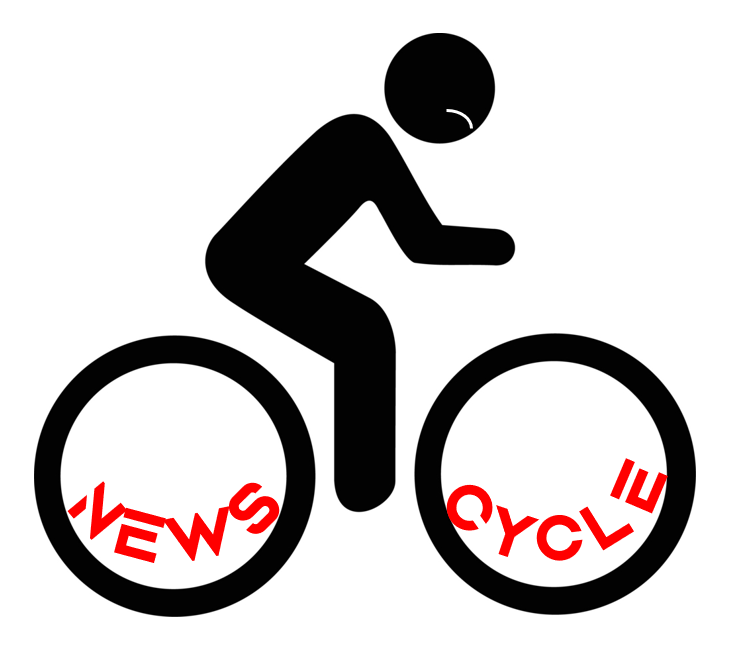
There’s quantitative research – all those numbers.
And of course qualitative research – focus groups, one-on-one interviews.
And then there’s word of mouth. That’s when your ear is to the ground and you’re listening to people around you.
While the anecdotal moments have absolutely no validity – an N of one – they often cut through nonetheless.
I’ve seen it way too many times over the years – an Uber or taxi driver, the GM’s spouse, or a listener you bump into at a remote or bar night.
And sometimes those hit and run comments stay with you – especially when they reflect a similar theme.
I’m hearing incidental comments these days from an interesting collection of random people I encounter through the course of living one’s life, specifically a barista, a person working as a receptionist at an investment company, and a parking lot attendant – all strangers – who just had to ask me/tell me just how screwed up and sad the world has become these days.
It’s hard to argue with these random moments of angst and exasperation from (mostly) complete strangers. But it feels to me like people are so frustrated and stressed over the goings-on in two all-out wars, the extreme polarity in our nation’s capital, and just the sense of unrest and anguish in the world, they are speaking out – OK, blurting out – their emotions. And they’re wearing them on their sleeves, their backpacks, and their yoga pants.
The world’s a tough place these days. And the news media and talk shows have no shortage of things to talk about. But who’s actively listening?
According to Pew Research, the percentage of Americans paying attention to news has mostly been going down since 2018. While Pew’s chart (below) stops in mid-2022, the pattern is pretty clear.
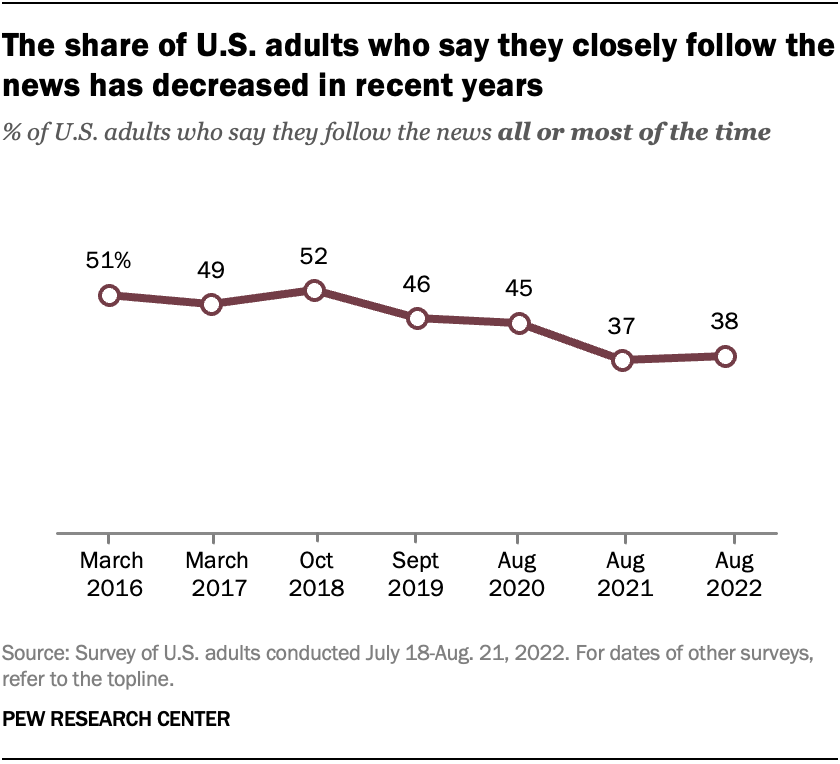
Pew’s Naomi Forman-Katz says this downtrend comes at the same time our society’s media habits are changing, trust in media has plummeted, and there are “high levels of news fatigue.” Or maybe we should call it “exhaustion.”
She quotes another Pew study conducted between 2016-2019 that measured a rise in the percentage of those who say they “are worn out by so much (news “coverage).” Even before the pandemic, it was on the rise.
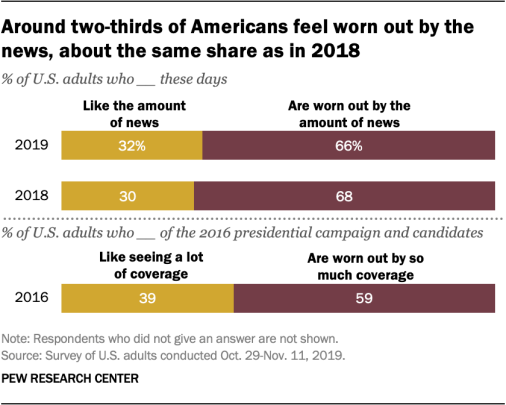
You can imagine how high that percentage of the “news fatigue” might be in 2023.
Closer to home, we can see signs of the collateral damage wreaked by a news cycle loaded with disheartening and tragic news in our new Public Radio Techsurvey 2023. When we zoom in on the 9% who say they’re listening to less public radio in the past year, you can see the fissures caused by an unforgiving series of rugged news events:
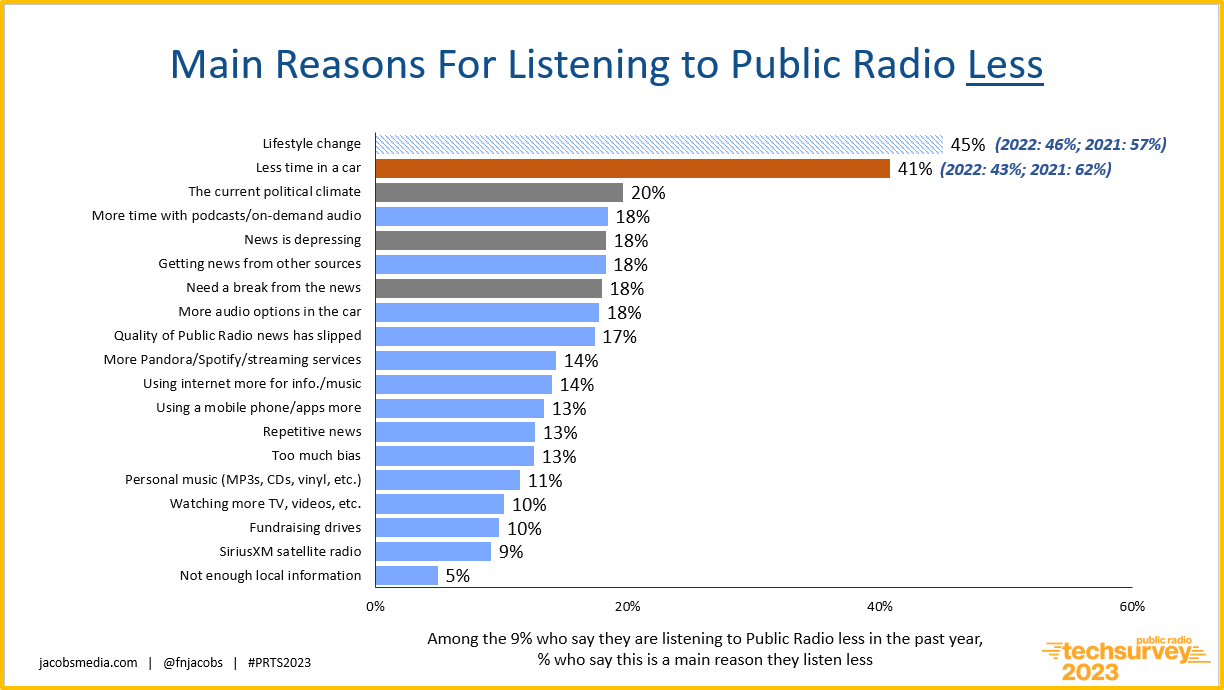
Once we get beyond lifestyle changes (ex: job changes, moves, retirements, etc.) and spending less time in a car (heading downward since the worst days of the pandemic), we see troubling signs in the gray bars. Roughly one-fifth of these less frequent listeners cite “the current political climate,” “the news is depressing,” and “I need a break from the news.” It’s hard not to read a pattern into this data.
And now heading into what will likely be called “the election of our lifetimes” next year, it’s hard not to think it will only get worse. If past is indeed prologue, the 2024 presidential race figures to be hotly contested and nasty with record amounts of ad dollars spent.
Political advertising may not impact public radio, but it will most certainly have an erosive effect on commercial stations “lucky” enough to attract those boxcars of bucks.
Late last month, an Inside Radio story reported on the BIA Advisory Services’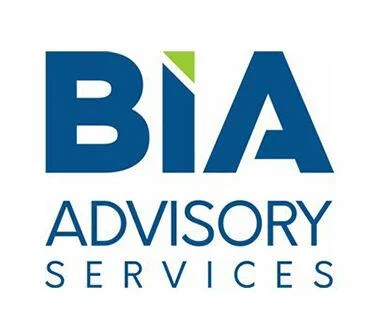 prediction that political ad spending will be robust. The firm’s VP/Forecasting & Analysis, Nicole Ovadia, says “Local political advertising will be fueled by the Presidential and Senate campaigns as well as issue-based advertising.”
prediction that political ad spending will be robust. The firm’s VP/Forecasting & Analysis, Nicole Ovadia, says “Local political advertising will be fueled by the Presidential and Senate campaigns as well as issue-based advertising.”
Imagine a 10-unit stopset where more than half the ads are political. While commercial stations can line up the trucks to haul away the campaign cash, its effect on the listening experience is sure to add to our collective malaise.
So what’s the antidote? How can radio cope with the ill winds most of us feel blowing as we head into another uncertain year?
For public radio, it may be as simple as following the tea leaves revealed by the City Square report sitting on desks throughout the system, along with our aforementioned Public Radio Techsurvey 2024. Each makes a compelling case to rebuild with local news coverage and an increased focus on community.
That might translate into a new show with a local bent, a podcast focused on a critically important close-to-home issue, and bolstering programming with well-respected local names – analysts, newsmakers, thought leaders.
And while a steady diet of “happy news” is not what public radio fans crave, finding the joy in local programs and newscasts might be a welcome relief from the blitzkrieg of bad news most people say they’re having trouble escaping from.
For news/talk and sports programming on the commercial radio side of the aisle, a case could be made to decrease the anger and vitriol, even though that advice might run counter to past successes.
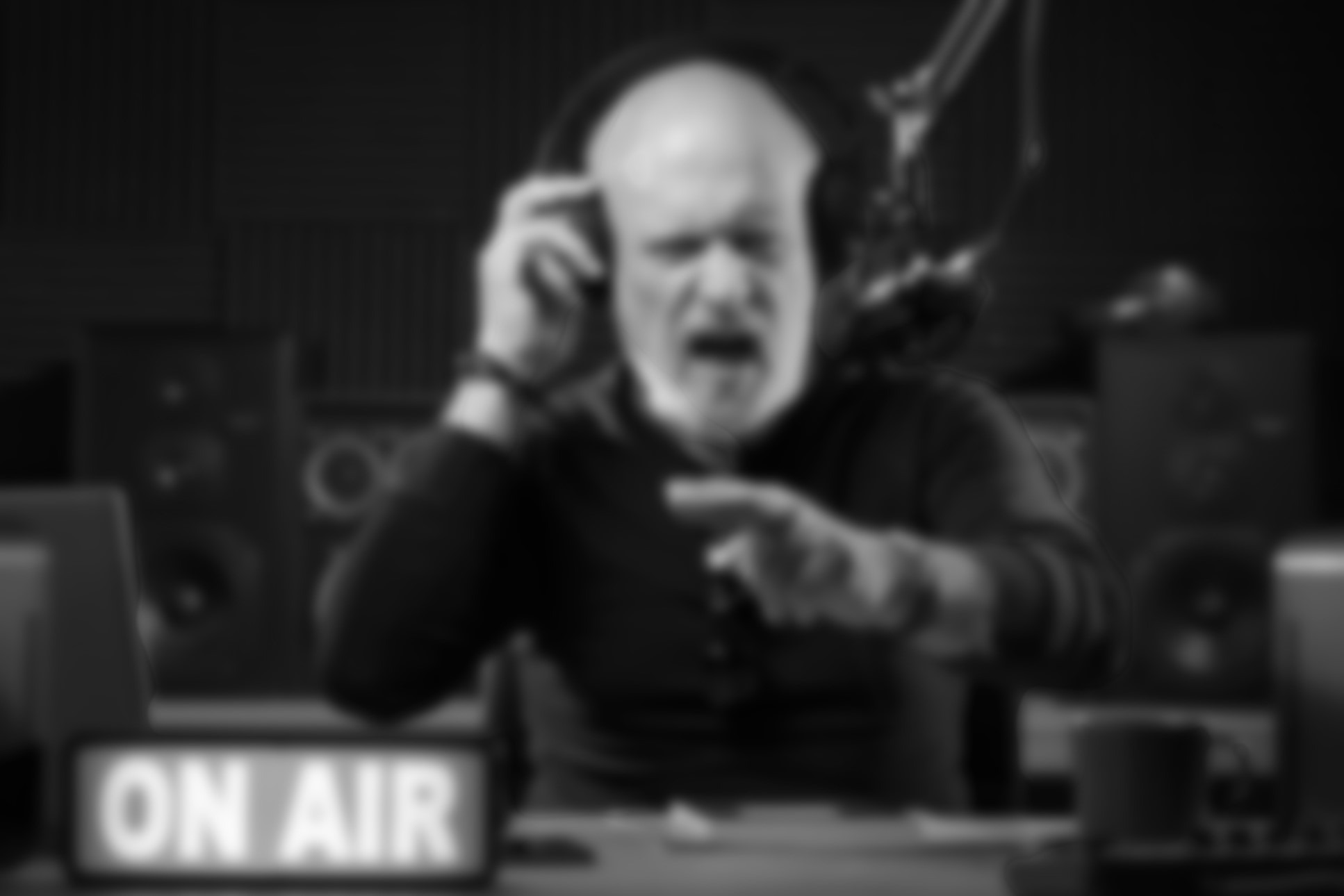 There’s a reason why reality TV has softened and so-called “shock jocks” are no longer littering morning radio.
There’s a reason why reality TV has softened and so-called “shock jocks” are no longer littering morning radio.
It’s also why polarizing political left vs. right shows like CNN’s old Crossfire have disappeared from the airwaves. Most of us don’t want to hear the nonstop arguing and shouting. In public radio, civility has consistently been a key ingredient in the medium’s success. For commercial radio, there are lessons to be learned.
The going could be markedly better for music stations, already as a destination for escape and getting as far away from the madding crowd as possible. Trip getaways, fantasy adventures, and special backstage perks can be unforgettable difference makers.
Let’s not forget some of the key “Whys” of radio – the reasons for tune-in and habitual listening. When we look closer at this chart, we see telltale signs radio listeners are already depending on their favorite radio stations for escape and comfort:
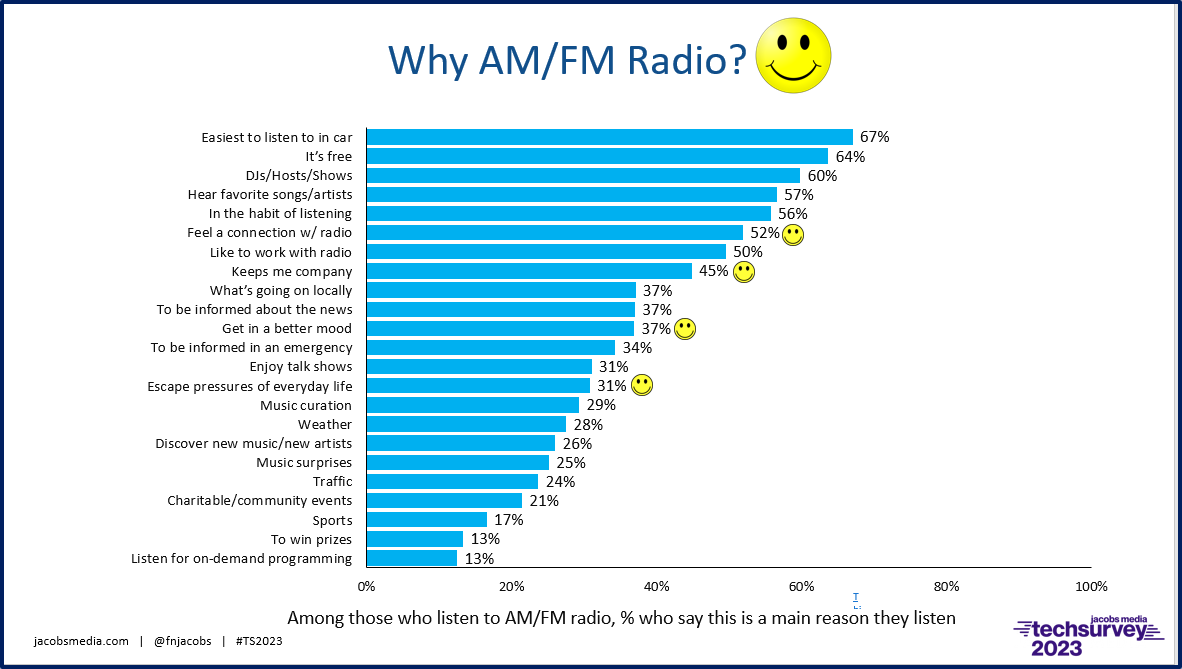
My not-so-subtle smiley faces tell a story here: the connection with radio, its ability to engender a sense of companionship, its role in mood elevation, and its potential to help the audience “escape from the pressures of everyday life.” All these attributes are mentioned as main reasons for listening among more than three in ten core listeners. They’re sending us a message. So, are we listening?
 This research finding underscores the intentional efforts by stations when it comes to community and charity, especially as this tough year winds down. I can see it unquestionably in our continuing work with Children’s Miracle Network Hospitals. It starts with bringing joy, comfort, and healing to others. But as we know, station employees – from talent to sales reps to behind-the-scenes support people – also feel the glow of contributing to the well-being of their communities.
This research finding underscores the intentional efforts by stations when it comes to community and charity, especially as this tough year winds down. I can see it unquestionably in our continuing work with Children’s Miracle Network Hospitals. It starts with bringing joy, comfort, and healing to others. But as we know, station employees – from talent to sales reps to behind-the-scenes support people – also feel the glow of contributing to the well-being of their communities.
And that brings us to the staff where another year of broadcast radio has been synonymous with more RIFs, few raises, and the wearing of more “hats.” And given the rough sledding ahead for radio, the first quarter of 2024 could be several weeks of hand-wringing and angst.
It’s likely holiday parties this year will be scaled back or nonexistent due to budgetary stress. Employers should think hard about how to express their appreciation to the rank-and-file, especially if it doesn’t show up in envelopes passed around in December.
up in envelopes passed around in December.
A well-known program director in our business often harped on his airstaff to “put themselves in the shoes of their listeners.” This meant visualizing and understanding what the audience is feeling when they’re listening to a show. Where are they, what are their situations, what are their moods likely to be, how can they as entertainers and hosts most effectively connect with listeners?
 It was always good advice, whether it was raining outside, the hometown team had won a championship, or if the stock market crashed. Ramping up a station’s core relatability factor makes all the sense in the world during these precarious times. It’s a matter of using your emotional intelligence to tune into the market’s mood. The very best air talent always knew how to regulate it and adjust to it.
It was always good advice, whether it was raining outside, the hometown team had won a championship, or if the stock market crashed. Ramping up a station’s core relatability factor makes all the sense in the world during these precarious times. It’s a matter of using your emotional intelligence to tune into the market’s mood. The very best air talent always knew how to regulate it and adjust to it.
Great breaks aren’t about checking off the boxes – calls, frequency, weather, promo, tease.
They’re about cracking that mic and forging a relatinoship and a connection with that one listener on the Dan Ryan, about to get fired, or worrying about her health or bouncing a check. I gave you the research, but if you listen to all the anecdotal “data” that’s all around us, you already know the truth about how so many are feeling and hurting.
Radio has that ability to turn those frowns upside-down. In the next many months, it is going to need to do just that.
Sign up for our upcoming Techsurvey 2024 and get insights like these for your station. Info here.
- Like A Pair Of Old Jeans - April 2, 2025
- What’s Fair Is Fair - April 1, 2025
- What’s On Your Bucket List? - March 31, 2025




Really great points, Fred. How about news reporters asking candidates about what they would want to do in office, instead of hitting default and letting them rant about what the other candidates are doing/have done wrong? As a veteran reporter who has covered the Iowa Caucuses and the New Hampshire Primaries, I can tell you those “what’s your platform” questions get drowned out by the vitriol between candidates…and that’s unfair to the voters. No wonder they don’t want to listen anymore. I stood eight feet away from Donald Trump in 2014 and politely had my hand raised to ask a question about how he planned to educate our future workforce. Instead, the same question was tossed around by various reporters…what did he actually say about John McCain? Seriously. Let’s just skip over any questions that would have a direct impact on American families and workers. It’s much more interesting for reporters to incite in a political cage fight.
The exhaustion Fred rightly notes stems not only from the sheer volume of news/information but the sharply increased stakes for the country now that people’s ordinary tendency to retreat into silos has been aggravated by rampant social media (where humanity has suffered its first defeat in the multi-round match with Artificial Intelligence).
The differences over what’s true and what’s nonsense are excruciating. Can radio really help, when corporate executives myopically chasing dollars, loose nihilists on the listeners under false cloaks like “Patriot Radio”?
The onus is on the citizen/end user to make those judgment calls. But even well-educated people struggle because of the sheet volume, as you note. Whether it’s “deep fakes” social media nonsense, or “news” designed to look and sound real, it is incresingly difficult for most of us to draw those distinctions, John. And yes, without getting melodramatic, our democracy is riding on it.
Excelllent perspective, Dianna. I think most people eould rather hear isssue-oriented responses rather than comments about the horse race. With all the news media we have, trying to cut to the quick (as they say) has become increasingly more difficult. thaat haas to be part of why repels consumers just seeking out the truth.
Local News and Information coupled with comfortable companionship is the Secret Sauce. Full service radio always made sense in all sized markets. While I applaud Podcasts for bring more folks into the audio delivery fold, licensed radio AM/FM aided by Digital/Stream/HD demands the investment, attention, protection and spotlight. Thank you, Fred! Once again, excellent stimulation.
Thanks for commenting, as allways, Clark.
Either because I’m in the D.C. area or because I’ve visited the content site for Spectrum News recently (or perhaps both), I’ve been served with some banner ads that point to https://www.spectrumreach.com/industries/political. What might be the primary ad specifically references Spectrum News (which is included on that page, but isn’t the main focus), while another ad touts the overall brand’s multi-screen reach.
Just in case it appears buried, here’s the Spectrum News-specific text on that page (omitting the footnotes)…
“Deliver locally relevant content with the #1 news network. Spectrum News, the #1 news network in our markets, offers broad national scale with deep local connections. We are the fastest-growing, unbiased local news network with more than 2.4M daily viewing households. The average household tunes in to Spectrum News nearly 2x each day, watching more than 1.5 hours per day.”
Thanks, as alwayas, Eeric, for that interesting piece of news about Spectrum.
There here have been a couple of talk stations in Chicago (long since changed format) where the host opened up the hour introducing the topic, and then taking calls from all side of the issue. That was interesting. Talk of the Nation (NPR) did the same thing.
The sports stations have lost me as a listener as its the same writers being interviewed at the same time every week by the same hosts. Rare that they take calls from listeners. And now everything is sponsored in sports play by play (this ______ is brought to you by______).
The podcasts I enjoy the most are the ones telling life stories or learning something new. I don’t even mind the ad breaks in them.
I read news on my tablet. But I make sure to tap on most every story so that the algorithm still feeds me everything.
Smart, insightful content creaters have the ability to produce material people lean into. It helps to have a particulaar voice or POV, while also having a good sense of where the audience is and what they’re thinking.
From my personal (and probably pointed) view, Dianna Kelly Monk is the most accurate assessment of what’s wrong with media and politics. I’m out here paying more for EVERYTHING in life and they’re out there complaining about the other candidate. I want to hear who’s gonna fix the problems of the people who actually pay their salary and I don’t. People used to get into politics to help society. Now they’re in it for themselves and the riches that it brings. Where’s the political/media excitement in that? Did it really start when Rush was trying to point out Bill Clinton’s problems ? Now we have no Rush. Now not only do we have the Dems vs. Republicans, we have Israel supporters vs. Hamas supporters. Environmentalists vs. Common Sense. Trump supporters vs. everyone else. Seems we’ve always had a few issues – (“For What It’s Worth”) but there’s more than ever and no one’s spouting the solution. Who wants to hear all that crap?
Dave, you’re making my case. Channel that furstration with the news and politicians and go listen to one of your favorite albums. You WILL feel better.